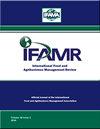发展中国家咖啡的可持续性属性:洪都拉斯国内咖啡市场
IF 1.5
4区 经济学
Q3 AGRICULTURAL ECONOMICS & POLICY
International Food and Agribusiness Management Review
Pub Date : 2023-09-13
DOI:10.22434/ifamr2022.0126
引用次数: 0
摘要
消费者越来越关注他们购物的可持续性。咖啡行业在制定倡议方面一直处于领先地位,这些倡议促进了价值链上可持续实践的采用。咖啡包装上标明可持续属性的标签旨在告知消费者并鼓励可持续消费。本研究的主要目的是分析消费者对洪都拉斯咖啡可持续标签(公平贸易,有机美国农业部,雨林联盟和4C)的知识和偏好,洪都拉斯是一个发展中低收入和高质量的咖啡出口国。该研究还评估了消费者对可持续咖啡标签的视觉关注。数据收集采用问卷调查(包括选择实验)从450名消费者的样本,以及眼动追踪技术(65名消费者的子样本)。尽管洪都拉斯的咖啡消费者对可持续标签的熟悉程度和了解程度较低,但他们愿意为这些标签的咖啡支付溢价(相对于平均价格的10%至27%)。消费者更关注有机USDA标签,这也是最愿意支付价值的标签。总的来说,研究结果表明,洪都拉斯有一个可持续生产的咖啡国内市场。本文章由计算机程序翻译,如有差异,请以英文原文为准。
Coffee sustainability attributes in developing countries: the Honduran domestic coffee market
Consumers are becoming increasingly concerned about the sustainability of their purchases. The coffee industry has been a leader in developing initiatives that promote the adoption of sustainable practices along the value chain. Labels on coffee packages that denote sustainable attributes are intended to inform the consumer and encourage sustainable consumption. The main objective of this study was to analyze consumers’ knowledge of, and preference for sustainable labels (Fairtrade, Organic USDA, Rain Forest Alliance, and 4C) on coffee in Honduras, a developing low-income and high-quality coffee exporting country. The study also evaluated the consumer’s visual attention to sustainable coffee labels. Data were collected using a questionnaire (including a choice experiment) from a sample of 450 consumers, as well as eye-tracking technology (a subsample of 65 consumers). Although Honduran coffee consumers have low levels of familiarity and knowledge about sustainable labels, they are willing to pay premiums for coffee with these labels (10% to 27% relative to average prices). Consumers pay more attention to the Organic USDA label, which is also the label with the highest willingness to pay value. Overall, the study’s results indicate that there is a domestic market for coffee produced sustainably in Honduras.
求助全文
通过发布文献求助,成功后即可免费获取论文全文。
去求助
来源期刊

International Food and Agribusiness Management Review
AGRICULTURAL ECONOMICS & POLICY-
CiteScore
2.90
自引率
0.00%
发文量
0
审稿时长
>12 weeks
期刊介绍:
The IFAMR is an internationally recognized catalyst for discussion and inquiry on issues related to the global food and agribusiness system. The journal provides an intellectual meeting place for industry executives, managers, scholars and practitioners interested in the effective management of agribusiness firms and organizations.
IFAMR publishes high quality, peer reviewed, scholarly articles on topics related to the practice of management in the food and agribusiness industry. The Journal provides managers, researchers and teachers a forum where they can publish and acquire research results, new ideas, applications of new knowledge, and discussions of issues important to the worldwide food and agribusiness system. The Review is published electronically on this website.
The core values of the Review are as follows: excellent academic contributions; fast, thorough, and detailed peer reviews; building human capital through the development of good writing skills in scholars and students; broad international representation among authors, editors, and reviewers; a showcase for IFAMA’s unique industry-scholar relationship, and a facilitator of international debate, networking, and research in agribusiness.
The Review welcomes scholarly articles on business, public policy, law and education pertaining to the global food system. Articles may be applied or theoretical, but must relevant to managers or management scholars studies, industry interviews, and book reviews are also welcome.
 求助内容:
求助内容: 应助结果提醒方式:
应助结果提醒方式:


